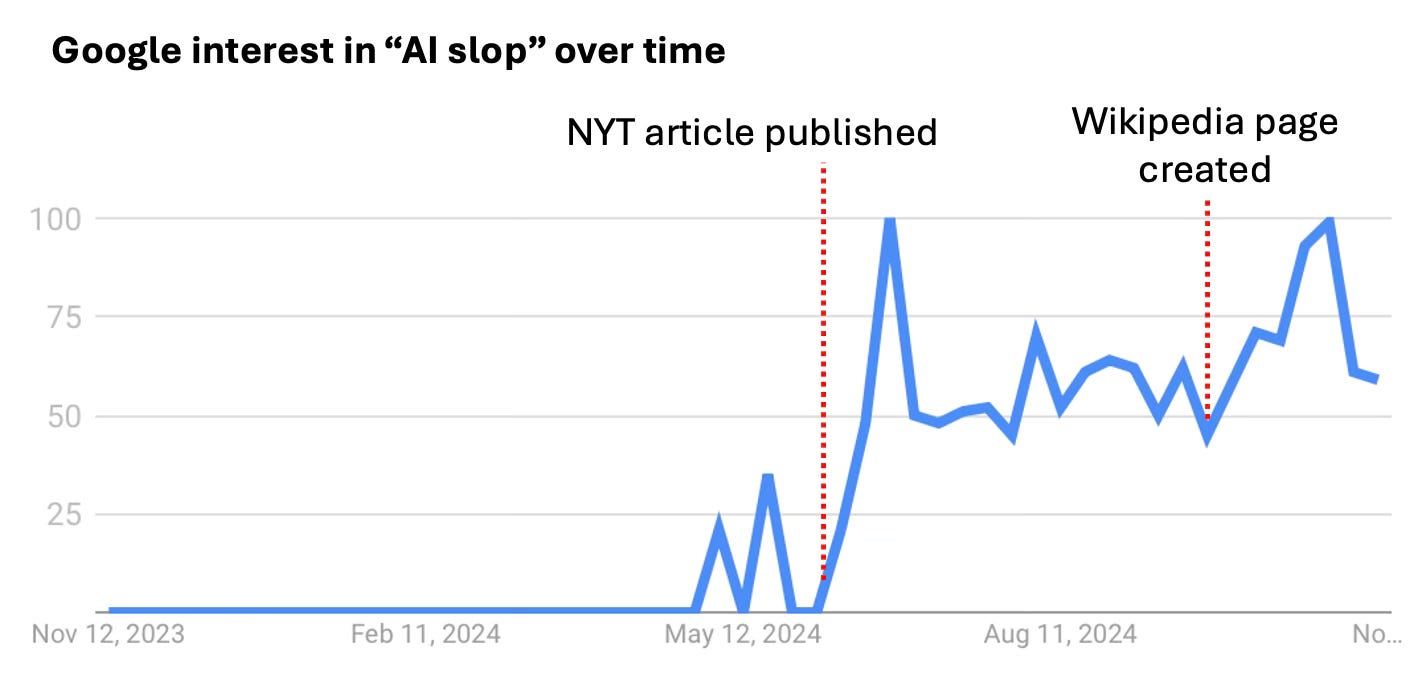the linguistic observer effect
can you ever really predict a word's popularity? a retrospective on "slop"
Back in June, I got a fascinating email from Benjamin Hoffman at the New York Times, asking whether the word “slop” had staying potential as a way to describe low-quality AI-generated content.
When I received Ben’s email, I had actually never heard the word used in this sense before, and that’s because “slop” had a very different digital footprint at the time. Sure, if you search the word today, you’ll come across a Wikipedia page, hundreds of articles from reputable news sources, and a viral account posting “Insane Facebook AI slop,” but this couldn’t have been further from the case six months ago.
I wish I had saved a screenshot of my early search results, but back then the only people commenting about “AI slop” were either anonymous 4chan users or YCombinator tech bros. It barely had a few thousand hits, and I must’ve clicked through most of them when I was trying to figure out whether the term could take off.
The next day, Ben and I hopped on a call, and I told him that “slop” had all the markings of future popularity. It felt natural, was being used in influential niche communities that historically influence the mainstream, and was easily applicable to the kind of bad AI content proliferating online. I did, however, add on a warning: the very act of publishing this article could ultimately be what makes or breaks the word.
By lending “slop” the legitimacy of the New York Times, we would instantly be elevating it against potential synonyms, giving it more of a platform to spread than its competitors. Alternatively, we could kill the word by making it seem unnatural, like Taylor Lorenz likely did with her 2021 article about the then-nascent word “cheugy.” I called this the Linguistic Observer Effect: by publicly observing a word, we inadvertently alter its trajectory.
Ben went on to publish his article, and I wrote a substack post wondering what would happen to the word.
Six months later, I think we have our answer. “Slop” has reached sustained usage in the media, and I’ve even heard my friends casually use the phrase (though I know they weren’t saying it earlier this year). This almost definitely happened because of the Times piece:
A mere two weeks after Ben’s article was published, the word slipped into a Washington Post article, a Business Insider article, and eventually more, causing the Google Trends spike in the graph above. By November, the Oxford English Dictionary chose it as a finalist for their 2024 Word of the Year.
Maybe “slop” could’ve eventually still gone viral, but there’s no way it would’ve happened at the same pace. We observed it, we changed it, and now it’s here to stay. Glad I was there for the whole ride.
I also wrote a guest post for Taylor Lorenz’s User Mag! Go check it out and follow her writing here.




imagine knowing that you as an individual contributed to the trajectory of a word. THATS MAD BRO
Adding your post as an update to my own post about “slop," published yesterday!